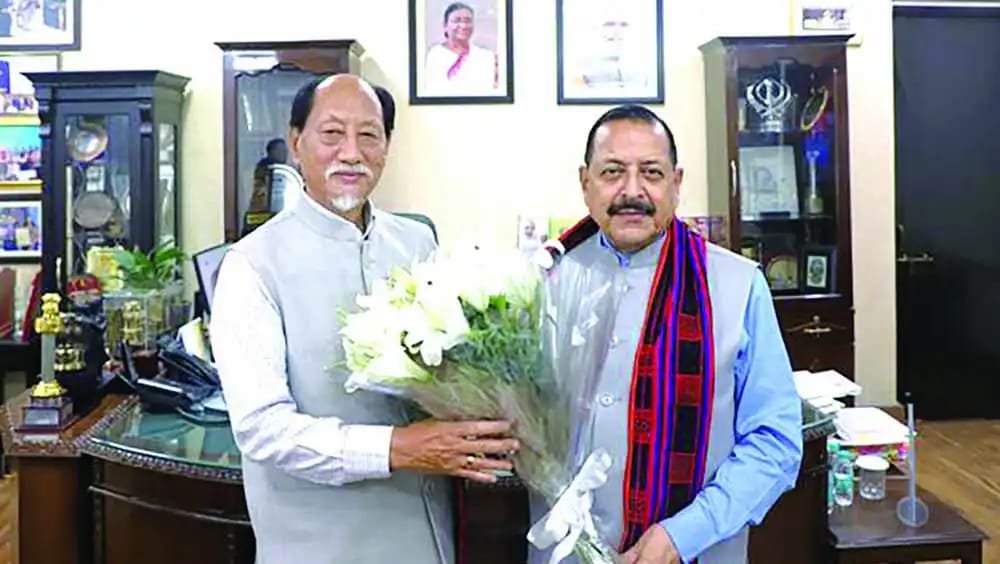The imperative for sustained Centre-State coordination has never been more critical, especially when addressing the unique developmental challenges faced by regions like Nagaland. In a significant meeting held in New Delhi on May 7, 2025, Union Minister Dr. Jitendra Singh and Nagaland Chief Minister Dr. Neiphiu Rio reaffirmed their unwavering commitment to accelerating development in Nagaland and the broader Northeastern region. This dialogue underscored the necessity of collaborative efforts to effectively implement flagship initiatives, aligning national priorities with regional needs.
Dr. Jitendra Singh, holding multiple key portfolios including Science & Technology, Earth Sciences, and Personnel, Public Grievances & Pensions, articulated the Central government’s focused approach towards fostering innovation, scientific research, and technology-driven development in the Northeast. This emphasis is not merely rhetorical; it represents a strategic vision to empower the region through advancements that can address its specific socio-economic challenges. The discussion highlighted the potential of leveraging central schemes to bridge developmental gaps and unlock new avenues for growth.
Chief Minister Neiphiu Rio, accompanied by key members of his cabinet, engaged in productive deliberations that centered on scaling up development in crucial sectors. The focus on science and technology, good governance, and administrative reforms reflects a comprehensive understanding of the multifaceted nature of development. The meeting explored concrete measures to enhance Nagaland’s infrastructure, particularly in science and technology, by promoting start-up incubation centers and fostering a culture of innovation. Moreover, the importance of cultivating a scientific temper among the youth through programs offered by the Department of Science & Technology (DST) and the Department of Biotechnology (DBT) was highlighted.
A significant aspect of the discussion revolved around the application of geospatial technology, provided by the Department of Space and Atomic Energy, in addressing the unique geographical challenges faced by Nagaland. These technologies hold immense potential in areas such as planning, disaster management, and agriculture, offering solutions tailored to the region’s hilly and remote terrain. Furthermore, Dr. Singh emphasized the role of start-up incubation and science outreach in empowering the youth, recognizing their potential as catalysts for change.
Recognizing the crucial role of efficient governance, Dr. Singh assured Chief Minister Rio of the Department of Personnel & Training’s (DoPT) commitment to enhancing the capabilities of civil servants in the Northeast through targeted training and career development initiatives. This focus on capacity building is essential for ensuring effective implementation of development programs and efficient public service delivery.
Chief Minister Rio, expressing his appreciation for the Centre’s consistent focus on the Northeast, reiterated Nagaland’s dedication to actively participating in national missions. He emphasized the importance of skilling, entrepreneurship promotion, and public grievance mechanisms that are tailored to the unique needs of the region. This acknowledgment of regional specificities is vital for ensuring that development initiatives are not only effective but also sustainable. By focusing on science and technology, good governance, and tailored regional development strategies, both leaders have demonstrated a shared commitment to fostering growth and prosperity in the Northeastern region. This collaboration emphasises the importance of a unified approach in addressing the developmental challenges and unlocking the immense potential of Nagaland.
Union Minister Dr. Jitendra Singh and Nagaland Chief Minister Dr. Neiphiu Rio in Delhi on May 7th signifies more than just a routine meeting. It represents a crucial confluence of national vision and regional aspiration, particularly relevant here in Dimapur, Nagaland, and the wider Northeast. The emphasis on sustained Centre-State coordination, underline by concrete discussions on leveraging science, technology, and administrative reforms, offers a tangible pathway towards unlocking Nagaland’s latent potential. As these collaborative efforts translate into tangible initiatives on the ground, the commitment demonstrated by both leaders holds the promise of a brighter, more developed future for the state and the entire North Eastern landscape.

